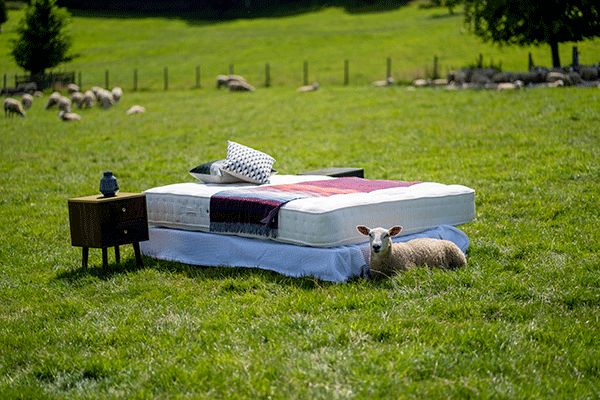John Lewis is launching a new sustainable mattress range made from British wool from Waitrose sheep farmers and without the use of chemical fire retardants.
The new range aims to cut waste in the wool industry, where farmers often burn the wool sheared from sheep due to its low market value and re-establish it as a widely used material.
The new range starts from £599 and, alongside its links to British farming, is described as naturally biodegradable and 100 per cent recyclable, with John Lewis offering a return and recycle scheme if customers repurchase the same bed.
Chemical fire retardants on mattresses and other soft furnishings are used widely across the UK, despite the known links with health issues and the fact that many of the chemicals used are banned for use in other sectors including agriculture, for toxicity to the natural environment.
It is a little-known issue in the UK, despite the work of campaigner and independent mattress producer Mark Dowen, who has been raising awareness of the issue alongside pioneering and producing a natural alternative through his Natural Mattress company in Devon.
Farmer Patrick Loxdale, who is one of those involved, said: “The wool market has been tough for a long time and now, with exports to China halted because of the pandemic, it’s even tougher. My hope is this initiative will kickstart a resurgence in interest in British wool.”

According to research done by John Lewis, two thirds of the public say they are unaware farmers were having to burn their wool, but over half said they’d be happy to pay more for products that use the material.
“Wool used to sustain entire economies but it has declined in value so dramatically that British farmers are now in some cases having to dump it,” said Waitrose senior agriculture manager, Jake Pickering. “We are in a fortunate position in running a partnership that operates both a supermarket and a home department store, so we saw an opportunity to make a difference to our farmers and the environment by ensuring the quality wool they’re producing is not wasted.
“We hope that in doing this, we will raise awareness of this issue and restore British wool’s status as the highly valued and high quality British commodity it used to be,” added Pickering.
Jo Dawson, chairman of H Dawson and The Woolkeepers, which has partnered with John Lewis on the initiative, said: “It is a privilege to be a partner in this new supply chain where the main focus by all parties is to re-establish the long term value of wool for the farmer.”
Farming minister Victoria Prentis said: “The UK has a proud tradition of wool production going back many centuries. I’m delighted that Waitrose and John Lewis are taking this step, to use an environmentally-friendly resource while also supporting British lamb producers.”















We have a loft to insulate, wishing to blanket the rafters to allow storage on the floor. I’d love to use a wool product but do not know if I can trust the assertion of the only producer I could find, that their product is made moth proof by some process or other. I have [like many people] had enough trouble with clothes moths without fearing I will invite hordes of them never mind ruin the insulation.
Presumably in beds and mattresses the outer covers will stop moths getting in.
As a nation we need to find ways to force hidebound trad housebuilders to use more materials like wool, but in ways that don’t cause problems [so not soaking wool in pesticides for instance!]